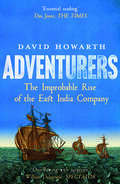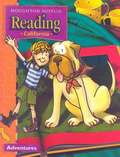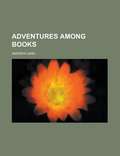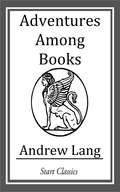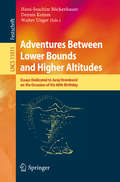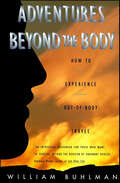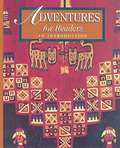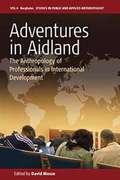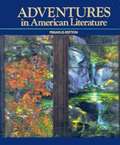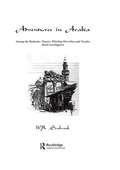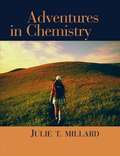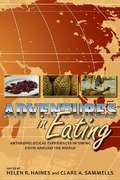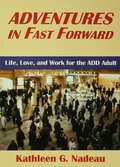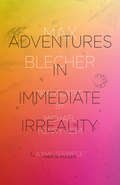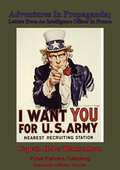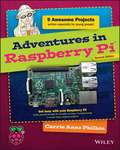- Table View
- List View
Adventurers: The Improbable Rise of the East India Company: 1550-1650
by David HowarthThe unlikely beginnings of the East India Company—from Tudor origins and rivalry with the superior Dutch—to laying the groundwork for future British expansion The East India Company was the largest commercial enterprise in British history, yet its roots in Tudor England are often overlooked. The Tudor revolution in commerce led ambitious merchants to search for new forms of investment, not least in risky overseas enterprises—and for these “adventurers” the most profitable bet of all would be on the Company. Through a host of stories and fascinating details, David Howarth brings to life the Company’s way of doing business—from the leaky ships and petty seafarers of its embattled early days to later sweeping commercial success. While the Company’s efforts met with disappointment in Japan, they sowed the seeds of success in India, setting the outline for what would later become the Raj. Drawing on an abundance of sources, Howarth shows how competition from European powers was vital to success—and considers whether the Company was truly “English” at all, or rather part of a Europe-wide movement.
Adventures
by Shane Templeton J. David Cooper John J. Pikulski David J. Chard Gilbert Garcia Claude Goldenberg Phyllis Hunter Marjorie Y. Lipson Sheila Valencia Maryellen VogtNIMAC-sourced textbook
Adventures (California)
by J. David Cooper John J. Pikulski Patricia A. AckermanNIMAC-sourced textbook
Adventures Among Books
by Andrew Lang17 Essays from 'The North American Review', 'The Idler' and other magazines, written by Andrew Lang.
Adventures Between Lower Bounds and Higher Altitudes: Essays Dedicated to Juraj Hromkovič on the Occasion of His 60th Birthday (Lecture Notes in Computer Science #11011)
by Hans-Joachim Böckenhauer Dennis Komm Walter UngerThis Festschrift volume is published in honor of Juraj Hromkovič on the occasion of his 60th birthday. Juraj Hromkovič is a leading expert in the areas of automata and complexity theory, algorithms for hard problems, and computer science education.The contributions in this volume reflect the breadth and impact of his work. The volume contains 35 full papers related to Juraj Hromkovič’s research. They deal with various aspects of the complexity of finite automata, the information content of online problems, stability of approximation algorithms, reoptimization algorithms, computer science education, and many other topics within the fields of algorithmics and complexity theory. Moreover, the volume contains a prologue and an epilogue of laudatios from several collaborators, colleagues, and friends.
Adventures Beyond the Body: How to Experience Out-of-Body Travel
by William BuhlmanExplore new worlds . . .If you ever wondered what might lie beyond the reality we experience every day, if you've ever thrilled to accounts of out-of-body travel and longer to go alone for the ride, this fascinating, practical guide is for you. America's leading expert on out-of-body travel tells the riveting story of his travels to other realms and offers easy-to-use techniques to guide you on your journey of a lifetime'and beyond.Travel into parallel realities . . .William Buhlman has trained out-of-body travelers in his workshop for more than a decade, teaching people how to project their consciousness outside the limits of their physical bodies and to explore dimensions and worlds beyond everyday life. Now he vividly recounts how own adventures in the parallel universe described in the new-physics theories of Stephen Hawkins, Paul Davies, and Fred Alan Wolf and presents his step-by-step guide to astral travel'including exercises, tips, techniques, and answers to your every question about out-of-body experiences.And discover surprising truths about reality, past lives, the soul, and life after death.Astral travel, Buhlman reveals, not only can expand your conscious'it can help verify the existence of the soul, teach you about past lives, and enhance your daily life. Find out in this compelling handbook for everyone who wants to venture beyond the body and take the ultimate trip.
Adventures For Readers, Book Two: Athena Edition
by SafierSequentially outlays poems, short stories, plays plus other literary works as it challenges the minds of the readers to carefully determine the main idea of the selection and exactly what the writer's aim was without having to directly derive from it. It aims at making skilled readers from most readers.
Adventures For Readers: An Introduction (Athena Edition) (Adventures In Literature)
by SafierAdventures For Readers, Adventures In Literature (Athena Edition)
Adventures In Aidland
by David MosseAnthropological interest in new subjects of research and contemporary knowledge practices has turned ethnographic attention to a wide ranging variety of professional fields. Among these the encounter with international development has perhaps been longer and more intimate than any of the others. Anthropologists have drawn critical attention to the interfaces and social effects of development's discursive regimes but, oddly enough, have paid scant attention to knowledge producers themselves, despite anthropologists being among them. This is the focus of this volume. It concerns the construction and transmission of knowledge about global poverty and its reduction but is equally interested in the social life of development professionals, in the capacity of ideas to mediate relationships, in networks of experts and communities of aid workers, and in the dilemmas of maintaining professional identities. Going well beyond obsolete debates about 'pure' and 'applied' anthropology, the book examines the transformations that occur as social scientific concepts and practices cross and re-cross the boundary between anthropological and policy making knowledge.
Adventures In American Literature: Pegasus Edition
by Harcourt Brace JovanovichAdventures In American Literature contains a wide range of American literature, both non-fiction and fiction, from the discovery of the America continent through the latter 20th century. Thematic concepts are traced throughout the book. Analytical and comprehension questions come at the end of each segment, along with specific elements of literary analysis.
Adventures In Arabia: Among The Bedouins, Druses, Whirling Dervishes And Yezidee Devil Worshippers
by SeabrookFirst published in 2001. Routledge is an imprint of Taylor & Francis, an informa company.
Adventures In Chemistry
by Julie T. MillardAdventures in Chemistry engages non-science majors in learning about compelling applications such as forensics, infectious diseases, and the chemistry of art, while also introducing them to the fundamentals of chemistry through clear, concise language. Using the metaphor of a hike as its pedagogical structure, the text presents core concepts and then shows how they apply to contemporary examples. With confidence in their understanding of basic principles, students can use their new chemical knowledge to make well-informed decisions about the foods they eat, the medicines they take, and the lifestyles they pursue.
Adventures In Darkness: The Summer of an Eleven-Year-Old Blind Boy
by Tom SullivanFrom the book jacket: Blind since birth, author and well-known entertainer Tom Sullivan recounts with wicked wit and captivating clarity the hair-raising adventures of his eleventh year in 1950s New England... escaping from his blind school, reliefpitcher in the neighborhood league, and boxing in a backyard bout with the neighborhood bully Adventures in Darkness is a classic tale of boyhood adventure through a formative season, a summer of hilarity and heart, tears and triumph! armed with a daring dream, and the fearlessness and mischief of youth. Tom refused to settle for the conventional confines of his blindness, and set in motion a chain of events that dynamically changed his life forever.
Adventures In Eating
by Clare A. Sammells Helen R. HainesAnthropologists training to do fieldwork in far-off, unfamiliar places prepare for significant challenges with regard to language, customs, and other cultural differences. However, like other travelers to unknown places, they are often unprepared to deal with the most basic and necessary requirement: food. Although there are many books on the anthropology of food, Adventures in Eating is the first intended to prepare students for the uncomfortable dining situations they may encounter over the course of their careers. Whether sago grubs, jungle rats, termites, or the pungent durian fruit are on the table, participating in the act of sharing food can establish relationships vital to anthropologists' research practices and knowledge of their host cultures. Using their own experiences with unfamiliar-and sometimes unappealing-food practices and customs, the contributors explore such eating moments and how these moments can produce new understandings of culture and the meaning of food beyond the immediate experience of eating it. They also address how personal eating experiences and culinary dilemmas can shape the data and methodologies of the discipline. The main readership of Adventures in Eating will be students in anthropology and other scholars, but the explosion of food media gives the book additional appeal for fans of No Reservations and Bizarre Foods on the Travel Channel.
Adventures In Fast Forward: Life, Love and Work for the Add Adult
by Kathleen G. NadeauWritten in response to common questions posed by adults with ADD in the author's clinical practice - and for all adults with ADD, as well as those who care about them - this book is designed as a clear and practical guide for day-to-day life. The author's perspective is one of compassionate realism as she answers specific questions related to understanding and accommodating ADD whether making daily decisions or larger life choices.
Adventures In Immediate Irreality
by Michael Henry Heim Max BlecherOften called "the Kafka of Romania," Max Blecher died young but not before creating this incandescent novel. Adventures in Immediate Irreality, the masterwork of the Romanian writer Max Blecher, vividly paints the crises of "irreality" that plagued him in his youth: eerie and unsettling mirages wherein he would glimpse future events. In gliding chapters that move with a peculiar dream logic of their own, this memoiristic novel sketches the tremulous, frightening, and exhilarating awakenings of a young man.
Adventures In Propaganda; Letters From An Intelligence Officer In France [Illustrated Edition]
by Captain Heber BlankenhornMany of the memoirs from the American Expeditionary Force cover the fighting that raged in 1918: from the shellfire to the wounds, glorious exploits and so forth. What marks Captain Blankenhorn's memoirs as so very different is the role that he served in during the War; he was an intelligence officer in charge of evaluating enemy propaganda and producing Allied propaganda for his own troops and those of the enemy. From posters to handbills, Blankenhorn's efforts whilst lesser known are equally fascinating and meritorious."...illustrations include some interesting samples of German and Allied propaganda. ." p. 214, Edward Lengel, World War I Memories, 2004, The Scarecrow Press, Lanham Maryland, Toronto, Oxford.
Adventures In Raspberry Pi
by Carrie Anne PhilbinCoding for kids is cool with Raspberry Pi and this elementary guideEven if your kids don't have an ounce of computer geek in them, they can learn to code with Raspberry Pi and this wonderful book. Written for 11- to 15-year-olds and assuming no prior computing knowledge, this book uses the wildly successful, low-cost, credit-card-sized Raspberry Pi computer to explain fundamental computing concepts. Young people will enjoy going through the book's nine fun projects while they learn basic programming and system administration skills, starting with the very basics of how to plug in the board and turn it on.Each project includes a lively and informative video to reinforce the lessons. It's perfect for young, eager self-learners--your kids can jump in, set up their Raspberry Pi, and go through the lessons on their own.Written by Carrie Anne Philbin, a high school teacher of computing who advises the U.K. government on the revised ICT CurriculumTeaches 11- to 15-year-olds programming and system administration skills using Raspberry PiFeatures 9 fun projects accompanied by lively and helpful videosRaspberry Pi is a $35/£25 credit-card-sized computer created by the non-profit Raspberry Pi Foundation; over a million have been soldHelp your children have fun and learn computing skills at the same time with Adventures in Raspberry Pi.
